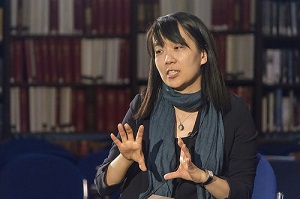De Zuid-Koreaanse schrijfster Han Kang werd geboren op 27 november 1970 in Gwangju, in de provincie Zuid-Cholla. Han Kang – haar naam is een verwijzing naar de rivier Hanggang die door Seoul stroomt – is de dochter van schrijver Han Sungwon en groeide vanaf haar elfde jaar op in Seoul. Zij studeerde aan de Universiteit Yonsei Koreaanse literatuur en voltooide haar studie daar in 1993. Han debuteerde met gedichten die verschenen in het tijdschrift “Literatuur en Samenleving” (Munhak-kwa Sahoe). Bekend werd zij kort daarna echter als schrijfster van proza. In 1994 won ze het met het korte verhaal Rood Zeil (붉은닻) de Literatuurprijs van de krant Seoul Shinmun. Daarna bleef zij doorgaan met schrijven en publiceerde zij verschillende bundels verhalen. In 1999 won ze een prijs voor de beste Koreaanse roman, in 2000 “de prijs voor jonge kunstenaars van vandaag,” van het ministerie van Cultuur en Toerisme, en tenslotte in 2005 de Yi Sang Literatuurprijs. Kang werkte ook als journaliste voor verschillende tijdschriften. Haar werk “De Vegetariër” werd in 2010 verfilmd en de novelle van “Baby Boeddha” diende als basis voor de film Scar. Momenteel doceert Han Kang creatief schrijven aan de Seoul Hogeschool voor de Kunsten.
Uit: The Vegetarian (Vertaald door Deborah Smith)
“Before my wife turned vegetarian, I’d always thought of her as completely unremarkable in every way. To be frank, the first time I met her I wasn’t even attracted to her. Middling height; bobbed hair neither long nor short; jaundiced, sickly-looking skin; somewhat prominent cheekbones; her timid, sallow aspect told me all I needed to know. As she came up to the table where I was waiting, I couldn’t help but notice her shoes—the plainest black shoes imaginable. And that walk of hers—neither fast nor slow, striding nor mincing.
However, if there wasn’t any special attraction, nor did any particular drawbacks present themselves, and therefore there was no reason for the two of us not to get married. The passive personality of this woman in whom I could detect neither freshness nor charm, or anything especially refined, suited me down to the ground. There was no need to affect intellectual leanings in order to win her over, or to worry that she might be comparing me to the preening men who pose in fashion catalogues, and she didn’t get worked up if I happened to be late for one of our meetings. The paunch that started appearing in my mid-twenties, my skinny legs and forearms that steadfastly refused to bulk up in spite of my best efforts, the inferiority complex I used to have about the size of my penis—I could rest assured that I wouldn’t have to fret about such things on her account.
I’ve always inclined towards the middle course in life. At school I chose to boss around those who were two or three years my junior, and with whom I could act the ringleader, rather than take my chances with those my own age, and later I chose which college to apply to based on my chances of obtaining a scholarship large enough for my needs. Ultimately, I settled for a job where I would be provided with a decent monthly salary in return for diligently carrying out my allotted tasks, at a company whose small size meant they would value my unremarkable skills.”

Han Kang (Gwangju, 27 november 1970)
